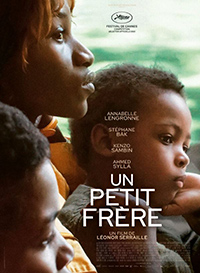Life in Rouen: Serraille Stacks Perspectives in Muted Tale of Immigration and Identity
 After taking home the Camera d’Or for her 2017 feature Jeune Femme, director Léonor Serraille takes on an ambitious trifecta of perspectives in Un petit frère (Mother and Son) regarding a family immigrating from the Ivory Coast to Paris in 1989. The difference between the original French language title, Un Petite Frere, or ‘my little brother,’ and its English language slant hints at the difficulty in defining the exact focus of this saga spanning over twenty years.
After taking home the Camera d’Or for her 2017 feature Jeune Femme, director Léonor Serraille takes on an ambitious trifecta of perspectives in Un petit frère (Mother and Son) regarding a family immigrating from the Ivory Coast to Paris in 1989. The difference between the original French language title, Un Petite Frere, or ‘my little brother,’ and its English language slant hints at the difficulty in defining the exact focus of this saga spanning over twenty years.
Although defying the usual slant of miserablism often underlining many tales of immigration, especially when they’re reflected through the prism of white privilege, this somewhat gentle tale also neglects its three main characters in sticking to superficiality as it flits between the three of them across time periods. A bit rough around the edges as far as transitions and tangential supporting characters, a definite plus is Annabelle Lengronne, a strong screen presence somewhat hobbled by the divided focus.
Paris, 1989. Rose (Lengronne), a mother of four, has immigrated from her native Ivory Coast to Paris for reasons which are initially unclear, but past trouble with her second husband is certainly a factor. She was only able to take two of her children, Jean and Ernest. As she stays with her sister while trying to get on her feet, she attempts to find stability through men, and eventually finds an affable enough suitor to move with her children to Rouen, where they can receive a better education. Fast forward ten years and Rose is only able to visit on the weekends while she’s away at work in Paris, her boys left to raise themselves. Jean’s behavior begins to spin out of control, failing his exams just as his mother decides to move back to Rouen with a new fiancé in tow, a man neither of the boys particularly care for. Ernest goes off to a friend’s summer home, returning to find the escalating conflict between Jean and their step dad has resulted in his brother moving back to the Ivory Coast. Another decade passes, and Ernest is now a professor of philosophy in Paris, emotionally estranged from his mother and living on his own without any real contact from his Jean. Rose arrives for a visit, carrying a letter from older brother to little brother.
Some of Serraille’s most interesting moments transpire in the first third, when Rose pulls focus as a melancholic mother hiding her personal pain at leaving two sons behind while grappling with being a stranger in a strange land in 1980s Paris. Avoiding the usual contrivances, she’s a sexually liberated woman, unafraid to throw herself into romantic and sexual liaisons while instilling her two sons with a sense of resiliency and the need to work twice as hard as anyone else to get ahead.
Annoying the hell out of her sister and brother-in-law, with whom she’s staying, Rose’s survival instincts lead her into the arms of a Frenchman who puts her up in Rouen. The jump ahead to teenage Jean as the focus is where Serraille tends to rely on typical story angles, and often it seems like some connective tissue is missing. A third act begins with pre-teen Ernest, witness to his brother’s demise, and Serraille instills his educational inspiration in being taken with Flaubert on what ends up being a memorable summer vacation (in which the director herself makes an appearance). This sequence also features some stilted performances from the child actors, including the host friend who makes a pass at Ernest. Later, when Ernest is an adult who teaches philosophy to children, Serraille tries to showcase the inherent racism of the Parisian police force, but the good intentions of the scene are undermined by poor, on-the-nose dialogue.
Eventually, the initial promise of Mother and Son dissipates, and what’s meant as one family’s story with universal and specific themes ends up feeling pointless, meandering. Intergenerational, cultural, economic and gender rifts are all part of the narrative milieu, but none are paused with any sense of precision. While Ernest is taken by a Flaubert quote by chance, another snippet from the author might apply to Mother and Son: “It’s hard to communicate anything exactly and that’s why perfect relationships between people are difficult to find.” How much imperfection you’re willing to accept in this film’s abilities as both a story and a film are another matter.
Reviewed on May 27th at the 2022 Cannes Film Festival – Main Competition. 116 Mins
★★½/☆☆☆☆☆


